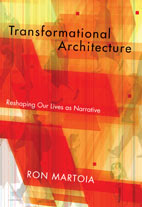 As I set down to gather my thoughts to review of "Transformational Architecture" by Ron Martoia, I began to realize that this was going to be more of a process then any book that I have offered my thoughts on previously. Why? The material here is too thought provoking and, to use a word offered in the title, too transformational. A couple paragraphs just would not be suffice, and I feel that it would not provide a true picture of how I feel about Martoia's work here. Let there be no misunderstanding, this is one of the more important books that I have read in quite some time. So what I want to do, is break the book up in its natural parts, and as I do this, I want to offer a few items.
As I set down to gather my thoughts to review of "Transformational Architecture" by Ron Martoia, I began to realize that this was going to be more of a process then any book that I have offered my thoughts on previously. Why? The material here is too thought provoking and, to use a word offered in the title, too transformational. A couple paragraphs just would not be suffice, and I feel that it would not provide a true picture of how I feel about Martoia's work here. Let there be no misunderstanding, this is one of the more important books that I have read in quite some time. So what I want to do, is break the book up in its natural parts, and as I do this, I want to offer a few items.The first item that I would like to provide is just a summarizing of the offering of each part by Martoia . I want to do this, because there is just so much in here, I find it would be most fair to allow the cream of the crop be present in my review. I also want the review to reflect the flow and the way Martoia presents his take on the essential narrative.
The second item that I would like to offer in my review is my thoughts and reflections of each part. I realize that my thoughts will play second fiddle to the incredible material that I plan on summarizing, but what is a review without the reviewers thoughts? I hope to add any insight or to just reaffirm items of importance.
The review in totality will be broken up in 3 additional posts from this one. The next post will reflect on Martoia's thoughts on the "3 Texts". The 2nd and 3rd posts will reflect the remainder of the book (which is not broken down like this by Martoia, however there is a lot of ground to cover so I will).
Let me end by proving the premise of "Transformational Architecture", as laid out by Ron Martoia in the "Introduction".
"If you are a follower of Jesus, if you take his motivational charge in Matthew 28 seriously, if you love him and what he has done with your life, then it is a natural overflow to want to share it with others. The question is How?" (Pg 11.)
Isn't this a question that we all have had, especially in our new postmodern context that we have found ourselves in? I personally resonate with a frustration when wanting to share this amazing Jesus. I have found that old methodology of handing out tracts and relaying apologetics have not worked either. So when Martoia asks this question, I found myself eager to see what Martoia purposes as a hope, in an effort that I make in sharing Jesus with others.
Martoia explains that not only our methodology needs to be examined but our message does to. This is the crux of the remaining of the book, and that is the message that we relay to others. But I am getting ahead, because there will be much more of this later. First, Martoia essentially sets out to explain the reasoning of the title of the book;
"... I find that people are genuinely interested in spiritual conversations. Why? God's original architecture plans for human 'heart space' is designed us with cravings, longings, yearnings, that sit at the intuitive level of our lives." (Pg 12.)
Do I agree with this? I think so. I find that some of my closest friends outside of any affirmative discipleship have the same spiritual cravings as I do. It only seems natural to allow this to be a starting point in spiritual conversations, and to some degree, I have experienced this. Martoia further explains his use of Architecture;
"....architecture emerges from a couple of different associations...(it)can be about buildings and design....But architecture can also be seen through the lens of software and computer design." (Pg 16)
Martoia further explains that computers have several levels of different communications with different operating systems. All of this communication is happening at the same time, so that the computer may fully operate to its fullest potential. He explains that "...this structure is referred to as the software's architecture."
Herein is the premise of what Martoia will be presenting, "We have been specifically built- architected- with core deign elements that cause us to crave transformation." (Pg. 17) Are we called to listen to this cravings? First we must decide if that there is this underling yearning, and if so, we must faithfully listen.
I think Martoia's presentation of his premise works, but it pales in comparison to the journey that he takes you on in the remainder of the book. That being said, its just the introduction, there is a reason why you keep reading further.
This, I hope you will do some time in the future. But in the mean time, stay tuned for the remainder of the review, the next portion will be coming in the near future. As I said before, I will be covering Martoia's presentation of the "3 Texts".
-dj
http://audaciousliturgy.blogspot.com/
.jpg)



